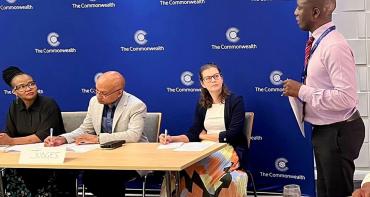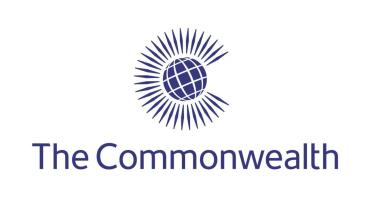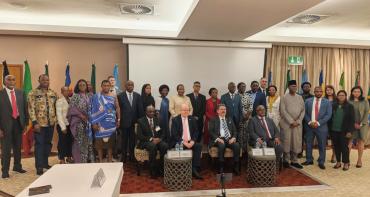Approval in Perth follows recommendation of the Group set up to deal with serious or persistent violations of Commonwealth values and principles
Leaders meeting in Perth, Australia for the Commonwealth Heads of Government Meeting (CHOGM) have agreed to a series of reforms to strengthen the role of CMAG in its dealings with serious or persistent violations of Commonwealth political values.
Outcomes from the report, entitled Strengthening the Role of the Commonwealth Ministerial Action Group were released today.
It follows two years of deliberations by CMAG, which was mandated in 2009 by Heads of Government in Trinidad and Tobago to consider ways of more effectively addressing the full range of violations.
“CMAG noted the widely shared view that it had hitherto been too reactive, and not sufficiently proactive,” it said.
Core changes include clearer guidelines and timeframes for engagement with agreed indicators as to the types of situations and developments that might be regarded as constituting a serious or persistent violation of Commonwealth values.
Leaders also agreed that the Secretary-General will speak out publicly in expression of collective disapproval of serious or persistent violations and that CMAG will be the custodian of the 2009 Affirmation of Commonwealth Values and Principles.
Salient points from CMAG’s Report to Heads of Government are:
- CMAG will continue to respond as before to instances where there is an unconstitutional overthrow of an elected government. In these instances CMAG has done well and has drawn upon the measures adopted at Millbrook.
- CMAG has concentrated on identifying how it might be more proactive and constructive, with clearer guidelines and timeframes for engagement when the situation in a country is causing concern.
- The core changes in CMAG’s mandate now accepted by Commonwealth leaders include using the following as among the types of situations that might be regarded as constituting a serious or persistent violation of Commonwealth values:
- The unilateral abrogation of a democratic constitution or serious threats to constitutional rule;
- The suspension or prevention of the lawful functioning of parliament or other key democratic institutions;
- The postponement of national elections without constitutional or other reasonable justification;
- The systematic denial of political space, such as through detention of political leaders or restriction of freedom of association, assembly or expression;
The following developments could also be taken into account:
- A national electoral process that is seriously flawed;
- The abrogation of the rule of law or undermining of the independence of the judiciary;
- The systematic violation of human rights of the population, or of any communities or groups, by the member government concerned;
- Significant restrictions on the media or civil society that prevent them from playing their legitimate role.
- The first call is, as always, on the Secretary-General’s Good Offices, which include the ability to offer Commonwealth technical assistance to help deal with the perceived deficiencies. However, in the more serious cases, if an offer of engagement and assistance by the Secretary-General is not accepted within a specified time-frame and the government in question fails to respond appropriately and serious or persistent violations of fundamental political values continue, the Secretary-General may consult with the Chair of CMAG on the way forward. The Secretary-General may permit a longer response period in cases where structural or other considerations in the relevant country in question would so warrant.
- The timeframe for engagement by CMAG itself has also been clarified so that if, following consultation and further attempts at engagement with a member government by the Secretary-General, the response and progress remain inadequate, the Secretary-General will brief CMAG. If, after a further two months from CMAG being briefed on the situation the judgement of the Secretary-General and the Chair of CMAG is that all efforts at engagement have been exhausted without progress, the situation will be brought to the agenda of CMAG, first informally and thereafter formally.
- CMAG will meet twice a year on a regular basis. It shall continue to convene on an ad hoc basis as needed and respond rapidly if an unconstitutional overthrow of government occurs.
- It has been agreed that CMAG will be the custodian of the 2009 Affirmation of Commonwealth Values and Principles (which is an update and strengthening of the Harare Principles).
- The Secretary-General will speak out publicly in expression of collective disapproval of serious or persistent violations.
Background
The Commonwealth Ministerial Action Group (CMAG) was established by Heads of Government in 1995 as a mechanism to deal with serious or persistent violations of Commonwealth political values.
CMAG’s role is to assess the nature of such infringements, and to make use of a series of measures in response to serious or persistent violations that were identified by Commonwealth leaders in 1995 in their Millbrook Action Programme.
At CHOGM 2009 in Trinidad and Tobago, “Heads of Government agreed that consideration be given to strengthening the role of CMAG, in order to enable the Group to deal with the full range of serious or persistent violations of the Harare Principles”.
In considering that 2009 mandate, CMAG noted the widely shared view that it had hitherto been too reactive, and not sufficiently proactive. Thus, it had dealt decisively with situations where constitutionally elected governments had been overthrown, but had not always been able to address other situations where Commonwealth values and principles were being seriously or persistently violated.
CMAG was conscious of the prevalent perception of the Group as a punitive body and that member governments felt a stigma associated with being placed on its agenda; they believed this made it difficult at times for CMAG to engage with members constructively.
In their 2011 report entitled Strengthening the Role of the Commonwealth Ministerial Action Group, CMAG put forward recommendations to Heads of ways in which the work of the Group could be made more effective.



